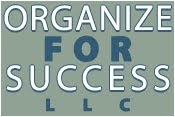 |
| Organize for Success® Turns 10 |
Today, let's cover my favorite ways to stop procrastinating:
10. Create a productivity playlist. Music is a highly motivating tool; some people get energized to work through fast-paced music while others get more focused through smoother tunes. Whichever you prefer, pick enough tunes in the tone you prefer to fill a set block of time and, then, use that set to motivate desired output.
9. Utilize a timer. Working in a focused, frantic manner for a short stretch can boost both efficiency and total output. If you are a competitive person, try getting more done in that short amount of time than you expect or have done previously; further, anyone can do an undesirable action for a short spurt. You may find, when the timer goes off, you are engrossed in the task and will keep at it.
8. Implement the right color scheme. A study published by Frontiers in Human Neuroscience found that red has been shown to increase attentiveness; a separate study by the University of British Columbia found that blue can boost creativity. Whether via color in your desk accessories, your walls, what you wear or what you eat, bring into your workspace what color fuels your desired actions.
7. Quiet any perfectionist tendencies. Earlier this week, when sharing my Top Ten Favorite Mantras, I explained how "Done is better than perfect so focus on good enough." Since perfectionism is frequently the cause of procrastination, focusing on the desired results often empowers us to get past waiting for the "right time" or continuing our work on projects until they are perfect. Likewise, stop comparing yourself with others; achieving your desired results usually has little to do with how the finished product compares with what others do or have done. Instead, focus on getting things done to the best of your ability, not necessarily in a perfect way.
6. Minimize interruptions. It can take 23 minutes to recover from a distraction at work, which means productivity requires a limit to what distractions we accept. Deactivate notifications of what's happening on social media, and schedule specific times to check into those sites. Send phone calls to voice mail while working diligently on specific project, catching up on calls at set times during your day. Turn off previews of what emails are coming into your inbox. Remove visual clutter from your workspace. Wear headphones to signal when you are not to be disturbed.
5. Spend more time with those getting things done. If you prioritize spending time with people in your life who are considered hard workers or go-getters, their energy will rub off on you and motivate similar productivity in yourself. Activity breeds activity so time with productive peers can insight greater productivity within ourselves when we spend time with those getting things done.
4. Break projects into smaller, bite-sized actions. No entire project can be completed at one time; instead, when those projects are broken down into tasks that can be completed step-by-step, you are empowered to check each item off, one by one, from a daily, weekly, monthly or other interval to-do list. Start each action with a verb, and do what you can to make sure it is carved down into something that can be accomplished in one sitting.
3. Set deadlines for each of those specific tasks. I have yet to find a calendar including "someday", and, when free time arises in our schedules, we are highly unlikely to address tasks we've been putting off. If you assign deadlines for each of the smaller, bite-sized actions within your current projects, you can block off time in your calendar for when they will be completed. Every "what" with a "when" is more likely to get accomplished, leading to more wins.
2. Gain clarity on anything that is confusing or unclear. Vague priorities, unclear directions, lack of knowing how to start and being unfamiliar with what steps to take to get the task done can all lead to procrastination. Therefore, prevent unclear expectations from holding you back by asking yourself or the person assigning you a task whatever questions will gain clarity; ask questions to better understand the objective of the task as well as what steps are recommended for getting it all done.
1. Hold yourself accountable for meeting the designated deadlines. Sometimes, people respond more effectively when a reward is held in front of them for completing a necessary task; other times, people are more effective when avoiding punishment or embarrassment. Once you know which motivates you more, use that information to drive your desired behavior and focus on your results. Make it fun, implementing gamification when possible, and play off what best motivates you to accomplish what must be done.
Which tactics do you prefer for limiting procrastination? Are there any on this list you're going to try?

No comments:
Post a Comment